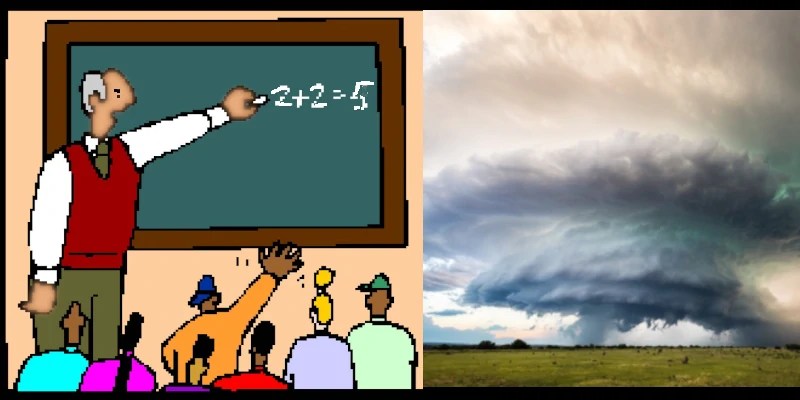Essay by Eric Worrall
A group of psychologists have claimed fear drives deniers to reject the truth. But they ignore evidence academic groupthink hysteria is the real “climate crisis”.
Time to freak out? How the existential terror of hurricanes can fuel climate change denial
Published: October 30, 2024 11.40pm AEDT
Jamie Goldenberg Professor of Psychology and Area Director, Cognitive, Neuroscience and Social Psychology, University of South Florida
Emily P. Courtney Assistant Professor of Instruction, University of South Florida
Joshua Hart Professor of Psychology, Union College
As TVs across Florida broadcast the all-too-familiar images of a powerful hurricane headed for the coast in early October 2024, people whose homes had been damaged less than two weeks earlier by Hurricane Helene watched anxiously. Hurricane Milton was rapidly intensifying into a dangerous storm, fueled by the Gulf of Mexico’s record-breaking temperatures.
…
Still, many people deny that climate change is a worsening threat, or that it exists at all. As its impacts grow more visible and destructive, how is this possible?
One answer lies in a unique facet of human psychology – specifically, in how people manage the fear aroused by existential threats. For many people, denying the existence of a climate crisis is not only convenient, but may feel psychologically necessary.
…
Terror management theory
The Pulitzer Prize-winning anthropologist Ernest Becker put it this way: “The idea of death, the fear of it, haunts the human animal like nothing else … to overcome it by denying it in some way is the final destiny for man.”
…
Terror management theory predicts that individuals whose ideologies conflict with environmental concerns may ironically double down on those beliefs to psychologically manage the existential threat posed by climate-related disasters. It’s similar to how mortality reminders can lead people to engage in risky behavior, such as smoking or tanning. Hurricanes may reinforce denial and commitment to a worldview that rejects climate change.
…
Read more: https://theconversation.com/time-to-freak-out-how-the-existential-terror-of-hurricanes-can-fuel-climate-change-denial-242390
What saddens me about such articles is the alarmist academics who write them never seem to publicly admit to the possibility they got it wrong.
Because there is plenty of evidence the climate crisis narrative is simply Western academic mass hysteria.
The strongest evidence for hysteria and groupthink is all the academics from outside the North American and European sphere of influence who are sounding the alarm on the lack of supporting evidence for alarmist climate claims.
My name is Yonatan Dubi, I am a professor of chemistry and physics at Ben Gurion University, Israel. I am also one of Israel’s leading advocates for rational environmentalism and climate realism. Together with a few colleagues we have conducted a very nice research, detailing and quantifying the flaws in the famous consensus study by Lynas et al, which (falsely) claimed the ridiculous 99% consensus. After a year long journey, our paper was finally published in the peer reviewed journal Climate, the link is https://www.mdpi.com/2225-1154/11/11/215.
Or from the Russian Academy of Sciences;
And of course there are people on the ground, who are simply calling BS on some of the more cherished climate narratives.
You would think a group of psychologists like the people who wrote the article at the top of the page might take an interest in the possibility they are actually living through a period of academic group hysteria, like past episodes I am sure they have studied. Even if they don’t accept this interpretation of events, they should at least mention it, and explain why they don’t believe it is the correct interpretation.
A courageous study which exposed the groupthink would echo down the ages, would be celebrated by our descendants, just as we celebrate academics of the past who stood against the darkness of ignorance and prejudice.
People always remember heroes who stand up for the truth. How long will people remember the name of psychologist Jordan Peterson?
But I guess even psychologists are susceptible to groupthink. It takes an academic with courage and conviction to truly question society’s delusions, someone who is prepared to accept the kind of punishment society always visits on high profile people who shoot politically convenient sacred cows.
Related


